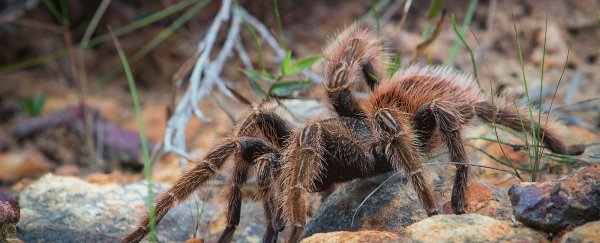Researchers have found a floodplain near a small town in Australia's Northern Territory that contains a 'megacluster' of 25,000 venomous tarantulas.
The diving tarantula - which gets its name from its ability to create air bubbles and survive underwater - usually lives in communities of 200 or 300 individuals. But the newly discovered group contains roughly 100 times that amount in a 10-km area.
While that sounds like the stuff of nightmares, researchers believe it could actually be a win for the nearby community of Maningrada, which is 482 km (300 miles) to the east of Darwin, its closest city.
Robert Raven, a senior curator at the Queensland Museum, believes the town's new arachnid neighbours may attract researchers from around the world and potential new income due to their potent venom, which can kill small animals and can cause nausea and vomiting in humans.
"Pharmaceutical applications could apply across a broad spectrum," he told Jeremiah Ganicoche from The Sydney Morning Herald, suggesting that the venom could lead to the discovery of powerful new drugs.
This huge population in such a small area also offers researchers a unique opportunity to better investigate and research the species, which was only discovered in 2006 and still doesn't have a scientific name.
Relatively little is known about the diving tarantula, except that it lives in burrows and survives the Northern Territory's wet season by creating little air bubbles and breathing underwater during flood periods.
"Because there are so many, it's not like we're hunting or picking for a [particular] animal. They're all around us," Raven told James Oaten over at ABC News.
"The entire intellectual property concerning the spider - its young, its adults, and its venom - are all property of the community," he added. "This is a resource for the community in a number of ways… and this could flow back into the community eventually to help them manage the parks better."
The cause of the tarantula population explosion still remains unknown. "Presumably, something is missing that would hammer them or there is something good [like a food source]," Raven told The Sydney Morning Herald. "It's one of the beauties of science, being able to say 'I don't know.'"
